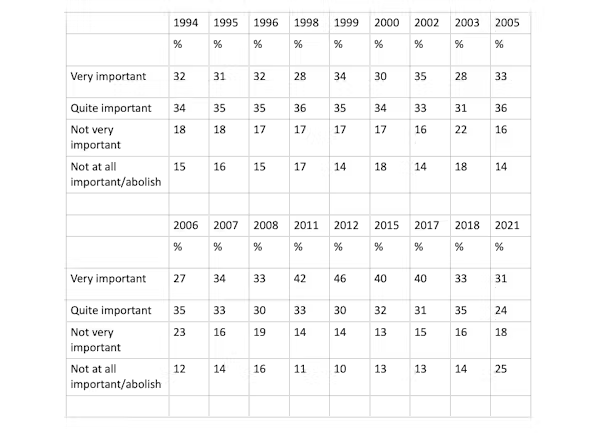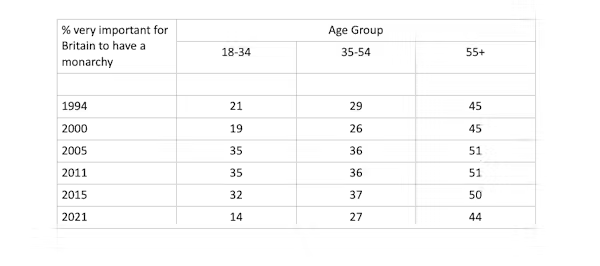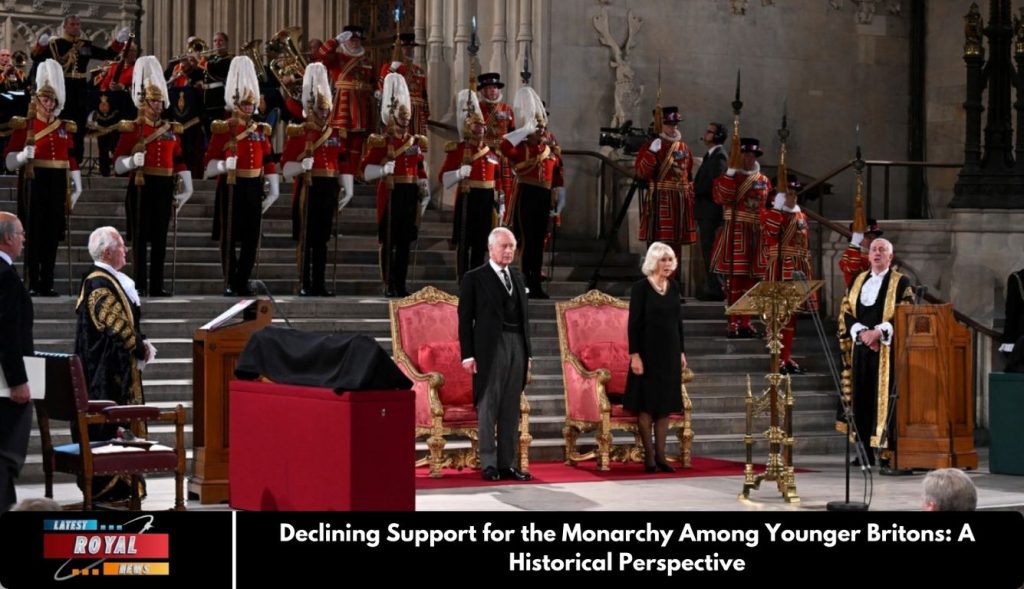The British monarchy has been a symbol of continuity and tradition for over a thousand years, with Queen Elizabeth II reigning for an impressive 70 years. Her passing has marked the end of an era, leaving the nation to reflect on her legacy and the future of the monarchy as an institution. As the country grapples with this monumental loss, questions have arisen about the monarchy’s role in modern Britain, especially in light of changing public attitudes over the years. While the monarchy has weathered various challenges in the past, the current landscape suggests that its future may not be as certain as it once seemed, particularly among younger generations.
Public support for the monarchy has long been a subject of scrutiny, with varying levels of approval depending on the era and the events that shape public perception. A consistent trend observed over recent decades is the growing skepticism among younger Britons, who are less likely to view the monarchy as an essential institution. This shift in attitudes is not new, however, as surveys show a long-standing generational divide in opinions about the monarchy. The changing social and political climate, coupled with high-profile scandals within the royal family, has contributed to this decline in support, raising important questions about whether the monarchy can continue to thrive in the face of a rapidly evolving society.
The Changing Role of the Monarchy in Modern Britain
Queen Elizabeth II’s reign spanned seven decades, and for most Britons, she was the only monarch they had ever known. She was seen not only as the head of state but also as a symbol of continuity and stability, guiding Britain through major historical events, including wars, economic upheavals, and significant cultural shifts. Despite the deep sense of national loss following her death, the future of the monarchy remains uncertain, especially as Britain navigates the modern age.
While the monarchy may have provided the head of state for over a thousand years, in the context of a modern democracy like the UK, its survival depends on public consent. The monarchy must retain the support of its citizens to continue functioning as an institution. As such, it is crucial to examine public opinion and attitudes toward the monarchy, especially since attitudes have fluctuated significantly in recent decades.
Long-Term Trends in Public Opinion

The British Social Attitudes survey, conducted by the National Centre for Social Research, has been tracking public opinion on the monarchy for over three decades. The survey has regularly asked how important it is for Britain to have a monarchy, shedding light on how attitudes toward the monarchy have evolved since the 1980s.
Since 1994, the majority of the public has consistently regarded the monarchy as “very” or “quite” important. In 1994, around two-thirds (66%) of the British public believed the monarchy was an important institution, and in subsequent years, the support for the monarchy remained stable, with a majority of people viewing it positively. This strong foundation of public support seemed unshakable, suggesting that the monarchy’s position in British society was secure.
A Glimpse into the Past: The 1983 British Social Attitudes Survey
The first British Social Attitudes survey in 1983 asked people whether it was important for Britain to have a monarchy. At that time, an overwhelming majority of 65% believed it was “very important,” while another 21% deemed it “quite important.” This widespread support for the monarchy appeared to be a unifying force across British society. For many, the monarchy was so deeply embedded in the fabric of the nation that the question itself seemed unnecessary.
However, despite the initial consensus in favor of the monarchy, this sentiment did not remain static over the following years. The events of the early 1990s brought about significant changes in public opinion, reshaping attitudes toward the royal family and the monarchy as an institution.
The Impact of “Annus Horribilis” on the Monarchy
In 1992, Queen Elizabeth II famously referred to the year as her “annus horribilis” (horrible year). This was a turning point for the monarchy, as it was marred by scandal within the royal family. The breakdown of marriages, including that of Prince Charles and Diana, Princess of Wales, captured the attention of the media and the public alike. The intense scrutiny of the royal family in the press, especially following the divorce of Charles and Diana in 1996, significantly undermined the monarchy’s reputation.
The royal family’s response to Diana’s tragic death in 1997 also played a crucial role in shaping public opinion. The initial reluctance to publicly mourn Diana was widely criticized, and it caused a temporary dip in public support for the monarchy. For the first time in decades, the proportion of Britons who felt that the monarchy was “very important” fell below 30%, signaling a shift in public sentiment. This marked a moment of reckoning for the monarchy, as it faced a wave of criticism over its perceived inability to adapt to modern societal expectations.
The Resurgence of the Monarchy: Royal Visits and Diplomatic Successes
Despite the setbacks of the 1990s, the monarchy managed to recover and regain some of its former stature in the years that followed. Key events, such as Queen Elizabeth’s historic visit to the Republic of Ireland in 2011, helped to heal long-standing wounds between Britain and Ireland. The Queen’s role in reconciling the troubled history between the two nations earned her admiration and demonstrated the monarchy’s diplomatic value.
Another significant event came in 2012, during the Queen’s Diamond Jubilee. The monarchy once again seemed to unite the nation, as celebrations across the UK showcased a sense of national pride and unity. The Queen’s decision to shake hands with former IRA commander Martin McGuinness in Northern Ireland further solidified her reputation as a figure of reconciliation. Following these events, public support for the monarchy increased, with around two in five Britons stating that the monarchy was “very important.”
New Challenges for the Royal Family: The Prince Andrew Scandal and Meghan and Harry’s Departure
In recent years, however, the monarchy has faced new challenges that have once again sparked debate about its future. Allegations against Prince Andrew, which led to his withdrawal from public life, tarnished the royal family’s image. Additionally, tensions between Prince Harry, his wife Meghan Markle, and the rest of the royal family have led to a rift within the institution. The couple’s decision to step back from royal duties and relocate to the U.S. further fueled discussions about the relevance and role of the monarchy in modern Britain.
These scandals have contributed to a decline in public support for the monarchy. The British Social Attitudes survey from 2021 revealed that only 55% of people felt it was “very” or “quite” important for Britain to have a monarchy. Furthermore, for the first time, a quarter of respondents (25%) said that the monarchy was “not at all important” or should be abolished. This decline in support marks a significant shift from the earlier days of Queen Elizabeth II’s reign, highlighting the vulnerability of the monarchy in the face of modern challenges.
You may also like:
Queen Elizabeth II Memorial: A Groundbreaking Tribute to Her Legacy and Vision for the Future
The True Cost of Europe’s Royal Family: A Breakdown of Public Funding and Responsibilities
The Enduring Influence and Vast Wealth of the World’s Remaining Monarchies
Vicars’ Close: Preserving a Medieval Gem at the Heart of Wells
The Monarchy’s Struggle with Younger Generations

One of the most striking trends in recent surveys is the generational divide in attitudes toward the monarchy. Younger people, particularly those under the age of 35, are significantly less likely to view the monarchy as “very important” compared to older generations. In 2021, only 14% of people aged 18-34 considered the monarchy to be very important, while 44% of those aged 55 and over held the same view.
This generational divide presents a challenge to the monarchy’s long-term viability. As younger generations come of age and older generations pass away, there is a risk that support for the monarchy will continue to decline. The monarchy’s ability to appeal to younger people will be crucial in determining whether it can retain its status as a central institution in British society.
Why Younger People Are Less Supportive of the Monarchy
The lack of support for the monarchy among younger Britons can be attributed to several factors. For one, younger generations are more likely to embrace values of equality and democracy, which may conflict with the idea of a hereditary monarchy. Additionally, many young people view the monarchy as outdated, irrelevant, or out of touch with the issues they care about, such as climate change, economic inequality, and social justice.
The rise of social media and greater access to information has also played a role in shaping attitudes. Younger people are more likely to engage in critical discussions about the monarchy online, where they are exposed to diverse viewpoints. This has led to increased scrutiny of the royal family’s actions and behavior, further eroding support among younger Britons.
The Stability of Public Opinion Over Time
Despite the declining support for the monarchy among younger people, the overall trend in public opinion has remained relatively stable over the past few decades. The generational gap has existed for years, and the attitudes of older generations have remained consistent over time. In 1994, only 22% of those born in the 1960s considered the monarchy to be “very important,” while 32% of the population as a whole held that view. Now, 38% of those born in the 1960s see the monarchy as important, reflecting the tendency for older individuals to become more supportive of the institution as they age.
This trend suggests that the monarchy’s ability to retain support may lie in its capacity to offer a sense of stability in an ever-changing world. The monarchy’s survival may ultimately depend on its ability to appeal to older generations who view it as an anchor in uncertain times.
King Charles III and the Future of the Monarchy
As King Charles III ascends the throne, the future of the monarchy will depend heavily on his ability to connect with the British public and maintain the institution’s relevance. The challenges facing the monarchy today are significant, but they are not insurmountable. King Charles’s leadership will play a pivotal role in determining whether the monarchy can continue to thrive or whether it will become a relic of the past.
While the monarchy faces growing opposition from younger Britons, it still commands significant support among older generations. The future of the monarchy will likely depend on King Charles’s ability to prove himself as a worthy successor and adapt the institution to meet the changing needs and expectations of modern Britain.
Frequently Asked Questions
Why is support for the monarchy lower among younger Britons?
Support for the monarchy tends to be lower among younger generations due to factors such as changing values around equality, democracy, and social justice. Younger people are more likely to question traditional institutions and may view the monarchy as outdated or irrelevant in modern society. Additionally, the rise of social media has exposed younger generations to diverse viewpoints and critical discussions about the royal family.
Has public support for the monarchy always been this low?
No, public support for the monarchy has fluctuated over time. While the monarchy enjoyed widespread support in the past, especially during Queen Elizabeth II’s reign, there have been periods of decline. Significant events, such as royal scandals and changes in societal values, have impacted public opinion. However, the generational divide in attitudes has been a consistent trend, with older generations showing more support than younger ones.
What role does social media play in shaping public opinion about the monarchy?
Social media plays a significant role in shaping public opinion by providing a platform for people, particularly younger generations, to voice their opinions and engage in discussions about the monarchy. Through social media, critical viewpoints and alternative perspectives can spread quickly, challenging traditional narratives and contributing to skepticism about the royal family. The increased accessibility of information also allows younger people to question the relevance of the monarchy in contemporary Britain.
What events have influenced public opinion about the monarchy in recent years?
Several events have influenced public opinion, including high-profile scandals within the royal family. The allegations against Prince Andrew and the rift between Prince Harry, Meghan Markle, and the rest of the royal family have led to increased scrutiny and criticism. Additionally, the monarchy’s response to various crises, such as the death of Princess Diana and Prince Harry’s departure from royal duties, has had a significant impact on how the public views the institution.
Can the monarchy survive with declining support, especially among younger generations?
While the monarchy faces challenges in maintaining support, particularly among younger generations, it is not necessarily doomed to fail. The monarchy has shown resilience over the years and has managed to recover from previous crises. Its ability to adapt to modern societal values and connect with younger people will be crucial in determining its future. Ultimately, the monarchy’s survival will depend on its ability to evolve and remain relevant in an ever-changing world.
How has the monarchy managed to regain support in the past?
The monarchy has managed to regain public support through key events that showcased its diplomatic and unifying role. Queen Elizabeth II’s visit to the Republic of Ireland in 2011, as well as her actions during the Diamond Jubilee in 2012, helped improve the monarchy’s image. These moments of reconciliation and diplomacy demonstrated the monarchy’s potential to heal divides and bring the nation together, which in turn boosted its public approval.
What impact has Queen Elizabeth II’s passing had on public opinion?
The death of Queen Elizabeth II has been met with widespread mourning and reflection on her long reign. While her passing has led to an outpouring of grief, it has also prompted discussions about the future of the monarchy. The transition to King Charles III’s reign has brought with it questions about whether the monarchy can continue to maintain its relevance and public support, particularly in the face of growing skepticism from younger generations.
How can King Charles III strengthen the monarchy’s position?
King Charles III will need to navigate the complexities of modern Britain, where public attitudes are shifting. To strengthen the monarchy’s position, he may need to embrace transparency, connect with younger generations, and adapt the monarchy’s role to reflect contemporary values. His leadership will be key in determining whether the monarchy can continue to thrive or whether its relevance will diminish over time.
Conclusion
The monarchy’s standing in British society has undoubtedly shifted over the years, with public support fluctuating in response to royal scandals, generational changes, and societal shifts. While the monarchy remains a deeply ingrained part of British life, its future is uncertain, especially as younger generations grow increasingly skeptical of its relevance.
Despite these challenges, the monarchy has shown resilience over the years, adapting to changing circumstances and maintaining a degree of public support. As Britain moves forward, the monarchy will need to navigate the complex dynamics of public opinion and ensure that it remains a relevant and unifying institution for future generations.


